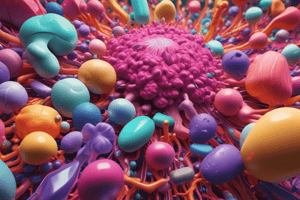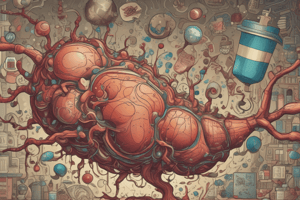Podcast
Questions and Answers
What is the effect of higher number of -OH groups on the steroidal nucleus?
What is the effect of higher number of -OH groups on the steroidal nucleus?
- Rapid onset of action and faster elimination from the body (correct)
- Slower onset of action and longer elimination from the body
- Increased potency but slower elimination from the body
- No effect on the onset of action and elimination from the body
What is the result of replacing -OH groups at C3 and/or C14 by H atoms?
What is the result of replacing -OH groups at C3 and/or C14 by H atoms?
- No effect on potency
- Significant reduction of potency
- Slight reduction of potency (correct)
- Increased potency
What is the orientation of the C17 side chain required for activity?
What is the orientation of the C17 side chain required for activity?
- No specific orientation is required
- β-orientation (correct)
- α-orientation
- γ-orientation
What is the effect of the sugar moiety on cardiac glycosides?
What is the effect of the sugar moiety on cardiac glycosides?
Which of the following is more potent?
Which of the following is more potent?
What is the trend in potency with increasing number of sugar units in oligosaccharide moieties?
What is the trend in potency with increasing number of sugar units in oligosaccharide moieties?
Which plant is a source of cardiac glycosides?
Which plant is a source of cardiac glycosides?
What is the commercial source of Digitalis lanata?
What is the commercial source of Digitalis lanata?
What is the principal glycoside of the wood of the African Acokanthera schimperi?
What is the principal glycoside of the wood of the African Acokanthera schimperi?
What is the cardiac effect of Thevetia peruviana glycosides?
What is the cardiac effect of Thevetia peruviana glycosides?
What is the result of partial hydrolysis of Thevetia peruviana glycosides?
What is the result of partial hydrolysis of Thevetia peruviana glycosides?
What is the family of plants that Calotropis spp belongs to?
What is the family of plants that Calotropis spp belongs to?
What is the use of Bufadienolides as cardioactive drugs?
What is the use of Bufadienolides as cardioactive drugs?
What is the reagent used in Legal's test for cardiac glycosides?
What is the reagent used in Legal's test for cardiac glycosides?
What is the result of Keller-Killiani's test for cardiac glycosides?
What is the result of Keller-Killiani's test for cardiac glycosides?
What is the name of the glycoside isolated from Urginea maritima?
What is the name of the glycoside isolated from Urginea maritima?
Flashcards are hidden until you start studying
Study Notes
Oxygen Substitution on Steroidal Nucleus
- Higher number of -OH groups results in more rapid onset of action and elimination from the body.
- Replacement of -OH groups at C3 and/or C14 by H atoms results in slight reduction of potency.
Structure Activity Relationship
- β-orientation of C17 side chain is necessary for activity, 17α-cardenolides (allocardenolides) are inactive.
- Sugar moiety has no cardiac activity, but when attached to C3 -OH group of steroidal moiety, activity is modified and influences pharmacokinetic behavior.
- Free aglycones are less potent than their glycosides.
- Type and number of sugar units may affect potency.
- Cardiac glycosides with 6-deoxy sugars (6-CH3) are more potent than their 6-CH2OH analogs.
- For oligosaccharide moieties, potency decreases with increase in number of sugar units.
Distribution in Nature
- Scrophulariaceae (Digitalis purpurea leaves - foxglove, Digitalis lanata leaves - white flowers)
- Apocyanaceae (Strophanthus kombe vine seeds - Africa)
- Liliceae (Urginea bulbs - squill, Europe, India)
- In toads (cardiac glycosides are also found in animals only in exceptional cases)
Digitalis
- Digitalis spp (Scrophulariaceae)
- D. lanata: Mediterranean/White, commercially produced in Ecuador, USA, and Holland (total glycosides, 1.5%) with major: Lanatosides A-E (primary glycosides) and digoxin.
- D. purpurea: British/Purple, commercially produced in Holland and Eastern Europe (total 0.5%) with major: Purpurea glycosides A, B, and E, digitoxin, gitoxin, and gitaloxin.
Strophanthidin
- Seeds of East African Strophanthus kombé were formerly official in the BP.
- Principal glycosides: K-strophanthoside, K-strophanthin, and cymarin, all based on the genin strophanthidin.
- Also found in Strophanthus hispidus.
Ouabain
- The principal glycoside of the wood of the African Acokanthera schimperi (A. ouabaio).
- Strophanthus gratus seeds contain 4-8% of ouabain (G-strophanthin), a rhamnose glycoside more stable than those present in other species.
Oleander Glycosides
- Thevetia peruviana (T. neriifolia) - yellow oleander, are a rich source of the glycoside thevetin A.
- Partial hydrolysis and the loss of two glucose units yields peruvoside.
- Peruvoside consists of L-thevetose linked to the aglycone cannogenin.
Other Sources
- Calotropis spp
- Asclepiadaceae
- Convallaria majalis (Liliaceae) - Lily of the Valley
Bufadienolides
- Found in some Liliaceae and Ranunculaceae, and in the toad venoms.
- The genins are partly free and partly combined with suberyl arginine.
- Therapeutically, they find little use as cardioactive drugs because of their low therapeutic index and their production of side effects.
Urginea maritima
- Squill
- Scillaren A, and an amorphous mixture of glycosides, scillaren B isolated.
- Scillaren A is the most important cardiac glycoside.
Chemical Testing
- Colour tests based on the aglycone:
- Legal's test: deep red color.
- Raymond's test: violet color - blue color.
- Kedde's test: violet color.
- Baljet's test: orange or red.
- Liebermann's test and Antimony test will give a positive reaction.
- Colour tests based on the glycone:
- Keller-Killiani's test (for 2-deoxy sugar): a blue ring between the 2 layers is a positive reaction.
Studying That Suits You
Use AI to generate personalized quizzes and flashcards to suit your learning preferences.




